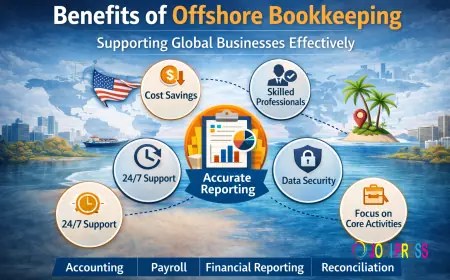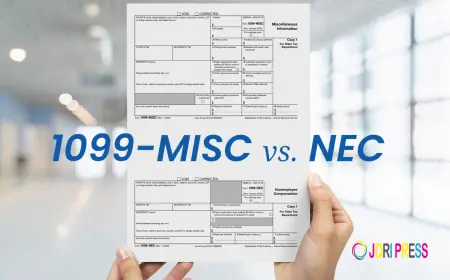Offshore Accounts Payable: Addressing US Regulatory and Tax Concerns
offshore accounts payable management partner, maintaining legal and tax compliance, and building clear workflows, US finance teams can turn offshore AP into a long-term advantage. In 2025

As US businesses embrace global strategies to boost efficiency and reduce operational costs, offshore accounts payable (AP) has gained significant traction. Yet, even with the undeniable benefits, many finance leaders hesitate mainly due to concerns around compliance, regulatory exposure, and tax implications. So, how can organizations leverage accounts payable offshoring services while staying on the right side of US regulations? Let’s break it down.
Why Offshore Accounts Payable Is on the Rise
Before we dive into legal and tax concerns, let’s clarify why offshore accounts payable is so appealing:
-
Labor cost savings: Offshore teams offer skilled AP professionals at a fraction of US-based salaries.
-
Scalability: Offshore services help rapidly growing companies scale without ballooning back-office costs.
-
Access to talent: Many US finance departments are facing talent shortages, making offshore support a strategic advantage.
-
Streamlined P2P operations: Offshore vendors often bring expertise in p2p accounts payable, helping companies automate and optimize processes.
But as with any global strategy, regulatory and tax factors matter.
Key US Regulatory Considerations for Offshore AP
1. Data Security and Financial Compliance
One of the top regulatory concerns with offshore accounts payable management is the secure handling of sensitive vendor and financial data.
What you need to consider:
-
SOX Compliance: If your company is publicly traded, Sarbanes-Oxley (SOX) applies. Offshore vendors must demonstrate internal controls that meet SOX standards.
-
Data Protection Laws: Ensure your offshore partner complies with US laws like GLBA (Gramm-Leach-Bliley Act) and potentially GDPR (if you deal with EU clients).
-
Cybersecurity standards: Offshore AP partners should implement robust protocols (firewalls, encryption, access controls) and be open to audits.
Tip: Always verify whether the vendor has third-party certifications like ISO/IEC 27001 or SOC 2.
2. Vendor Contracts and SLAs
An offshore AP partner essentially becomes an extension of your finance team. That makes well-structured contracts essential.
What should be in your Service Level Agreement (SLA)?
-
Defined roles and responsibilities
-
Clear escalation paths
-
KPIs for invoice turnaround time, error rates, etc.
-
Compliance obligations and audit rights
A legally binding agreement that aligns with US business laws ensures accountability and risk mitigation.
US Tax Implications: What You Need to Know
1. Transfer Pricing Compliance
If your offshore AP function is handled by a foreign subsidiary or related party, transfer pricing rules apply. The IRS requires transactions between related entities to be priced at arm’s length.
You must document:
-
Services provided by the offshore team
-
Cost allocations and markups
-
Benchmarks proving pricing is fair and market-based
Failing to comply can trigger IRS penalties and back taxes.
2. Foreign Vendor Withholding Tax
If you’re paying an offshore third-party vendor, you may be subject to withholding tax rules under IRS regulations, especially if there's a US-sourced component to the payments.
Make sure to:
-
Collect appropriate tax documentation (like W-8BEN or W-8BEN-E)
-
Determine if a tax treaty applies to reduce or eliminate withholding
-
Consult a tax advisor to understand your remittance responsibilities
3. Permanent Establishment (PE) Risk
If you outsource to a dedicated offshore team that acts under your business control, you may risk creating a permanent establishment in that country.
This could mean:
-
Being subject to local corporate tax
-
Facing double taxation if not planned correctly
US startups and mid-size businesses often overlook PE exposure. Work with an international tax advisor to plan structure and documentation properly.
Best Practices to Mitigate Regulatory and Tax Risks
To confidently implement offshore accounts payable management, follow these steps:
Conduct Risk Assessments
-
Evaluate jurisdictions for political, legal, and economic stability.
-
Choose countries with strong data protection and IP laws.
Vet Offshore Partners Rigorously
-
Ask for compliance certifications.
-
Review third-party audit reports.
-
Understand local labor laws and talent availability.
Maintain Clear Documentation
-
Keep detailed contracts, SLAs, and tax records.
-
Monitor offshore team performance via dashboards and audit logs.
Consult Tax and Legal Experts
-
Use cross-border tax professionals to avoid unexpected liabilities.
-
Establish clear intercompany service agreements, if applicable.
How Offshore AP Supports Compliance and Innovation
Interestingly, Offshore Accounts Payable isn’t just about cost-cutting. Done right, it can also support compliance, visibility, and process innovation.
How?
-
Standardized processes: Offshore teams often work with multiple clients, bringing best practices and automation tools.
-
Audit readiness: Offshore partners with robust compliance systems make audits smoother and faster.
-
Technology integration: Many offshore vendors specialize in p2p accounts payable automation, giving your team access to modern tools without large investments.
Is Offshore Right for You?
Not every business is ready for offshore AP. You should ask:
-
Do we have internal capacity to manage and monitor offshore relationships?
-
Are our AP processes standardized enough for smooth handover?
-
Are we equipped to handle multi-country tax and compliance responsibilities?
If the answer is yes, accounts payable offshoring services could provide significant strategic advantages.
Final Thoughts
Offshore accounts payable services offer major benefits for US companies—cost savings, scalability, and operational agility. But success depends on how well you navigate regulatory and tax challenges. By choosing the right offshore accounts payable management partner, maintaining legal and tax compliance, and building clear workflows, US finance teams can turn offshore AP into a long-term advantage. In 2025, offshore isn’t just an option it’s a strategic lever for modern finance leaders who want to optimize p2p accounts payable processes without compromising governance or control.
What's Your Reaction?
 Like
0
Like
0
 Dislike
0
Dislike
0
 Love
0
Love
0
 Funny
0
Funny
0
 Angry
0
Angry
0
 Sad
0
Sad
0
 Wow
0
Wow
0
















































